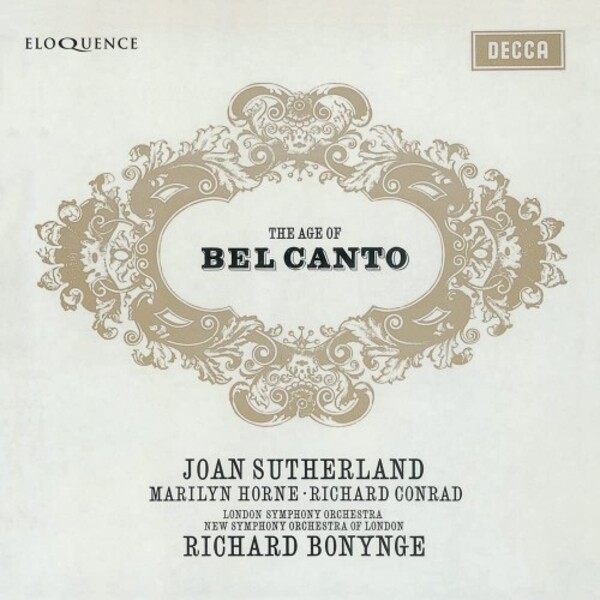
The Age of Bel Canto
£14.20
In stock - available for despatch within 1 working day
Despatch Information
This despatch estimate is based on information from both our own stock and the UK supplier's stock.
If ordering multiple items, we will aim to send everything together so the longest despatch estimate will apply to the complete order.
If you would rather receive certain items more quickly, please place them on a separate order.
If any unexpected delays occur, we will keep you informed of progress via email and not allow other items on the order to be held up.
If you would prefer to receive everything together regardless of any delay, please let us know via email.
Pre-orders will be despatched as close as possible to the release date.
Label: Australian Eloquence
Cat No: ELQ4844328
Format: CD
Number of Discs: 2
Genre: Opera
Release Date: 8th April 2022
Contents
Works
Gitano-gitana (bolero)Artaxerxes
Artists
Joan Sutherland (soprano)Marilyn Horne (mezzo-soprano)
Richard Conrad (tenor)
London Symphony Orchestra
New Symphony Orchestra of London
Conductor
Richard BonyngeWorks
Gitano-gitana (bolero)Artaxerxes
Artists
Joan Sutherland (soprano)Marilyn Horne (mezzo-soprano)
Richard Conrad (tenor)
London Symphony Orchestra
New Symphony Orchestra of London
Conductor
Richard BonyngeAbout
A few years later, interviewed in company with Bonynge, she expressed herself more forthrightly on the subject. ‘We are entertainers,’ she remarked, ‘and unless we entertain the public, the purpose of our work is defeated. We’re the ones who are paid to do that, and they pay to listen, and they should bloody well get something they can enjoy or else it’s criminal.’
‘Something they can enjoy’ is as much as anything the artistic credo behind The Age of Bel Canto, recorded in June 1963, which brought together obscure items from familiar composers (Mozart’s Il Re Pastore, Bellini’s La Straniera) with composers hardly more than names in a dictionary at the time. As Richard Bonynge wrote for another reissue of the set, reprinted here: ‘Even the Handel revival had barely begun. The young singers were at the beginning of their careers and their enthusiasm shines through these performances.’
Not all the critics at the time were convinced – one of them remarked that the ‘long, extremely silly scene from La Straniera can go right back on the shelf whence it came’ – but Sutherland’s public assuredly was, and the set proved a commercial success in inverse proportion to the familiarity of the repertoire. Now that singers in the early-music world and farther afield have absorbed these pioneering lessons in the importance of stylish ornamentation and shapely legato, Sutherland and her colleagues appear as figures ahead of their time.
“Conrad is probably more adept than any other contemporary tenor in execution of vocal ornamentation. He has a real trill, excellent stylistic sense and an admirable legato … Sutherland is for the most part in very good form. The Piccinni and Shield selections could not be bettered.” – High Fidelity, January 1965
“There are many truly novel items ... Miss Sutherland is right in her element.” – High Fidelity, April 1965
“No one could fail to respond to the virtuoso work. The other two singers are equally brilliant.” – Stereo Review, May 1965
“Sutherland is in fantastic voice throughout … [this set] would demonstrate to anyone who wanted to find out exactly why Sutherland was such a sensation … A great classic of the gramophone.” – Gramophone, November 1996
Error on this page? Let us know here
Need more information on this product? Click here